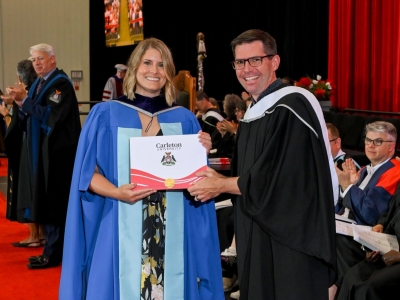A project dedicated to unpacking how journalism education changed through the pandemic – and what changes promise to stick – was awarded a $21,000 Social Sciences and Humanities Research Council Connection grant in October.
“From the earliest days of COVID-19, we saw instructors, staff and students collaborating to reimagine journalism classes as our newsrooms and studios went online,” Trish Audette-Longo, an assistant professor in the School of Journalism and Communication, said.
“Carleton was not alone in this. Educators across Canada had an opportunity to reconsider how they taught journalism. Our project invites reflections on accessibility, approaches to addressing journalism’s racist and colonial legacies, and how practices introduced since 2020 might renew and change the industry’s landscape.”
The project, “Forced Change: Pandemic Pedagogies and Journalism Education,” is expected to be a special multimedia issue of the bilingual peer-reviewed journalism studies journal Facts and Frictions.
The special issue’s editorial team includes Carleton journalism professors Audette-Longo, Christine Crowther, Nana aba Duncan (the Carty Chair in Journalism, Diversity and Inclusion Studies), Université du Québec à Montréal journalism Prof. Chantal Francoeur and independent Toronto-based journalist and educator Shenaz Kermalli.
“I think it’s really important that we have a record of how educators have managed at this time – what people have learned, or the different ways that they have adjusted,” Duncan said.
“We should be able to look at this and use it not only for a pandemic but for any other disruptive time that we’re going to have in our collective lives.”
SSHRC Connection grants are designed to support outreach or knowledge mobilization projects.
“Forced Change,” scheduled for publication in 2023, is expected to be the first Canadian publication to pool new research on journalism education through the pandemic.
The issue’s call for proposals also invites educators to share shorter commentary pieces or examples of their teaching materials. In the spring, a cross-section of educators will be invited to participate in remote roundtable discussions that will be produced as a podcast series.
“Journalism education brings a lot of people into our classrooms as instructors: full-time faculty, staff with specialized technical skills, contract instructors whose primary work is in professional journalism organizations, and graduate students,” Crowther said.
“We want as many of these people as possible to be part of this discussion. Having different formats for contributions is a way to acknowledge that not everyone has the time, background, or support needed to write a traditional academic paper. It also makes the final outputs more accessible for different kinds of audiences.”
Alongside funding and in-kind support from J-Schools Canada and Carleton University’s School of Journalism and Communication, Teaching and Learning Services, Faculty of Public Affairs and Office of the Vice-President (Research and International), the SSHRC Connection grant will allow the editorial team to hire and train up to 14 post-secondary students in a range of roles including as podcast and social media producers.
Learn more about Facts and Frictions, published by J-Schools Canada, and “Forced Change” here: https://factsandfrictions.ca The special issue is open to proposals until Dec. 15 and follow-up questions can be sent to forcedchange.changementforce@gmail.com
Monday, December 5, 2022 in General, Journalism News, News
Share: Twitter, Facebook



